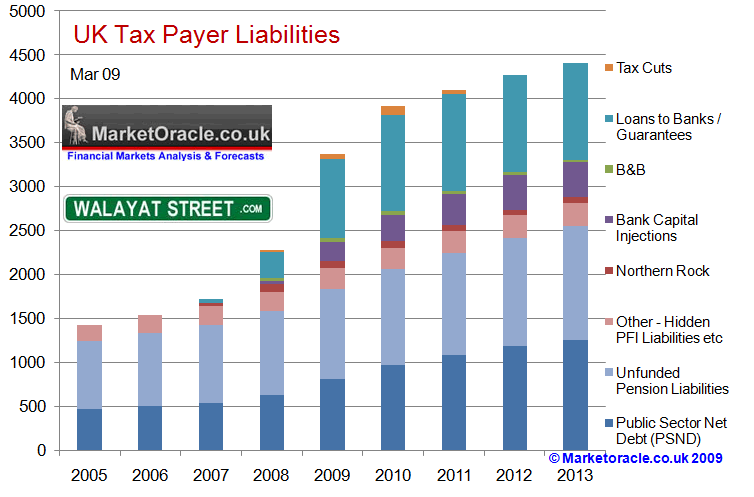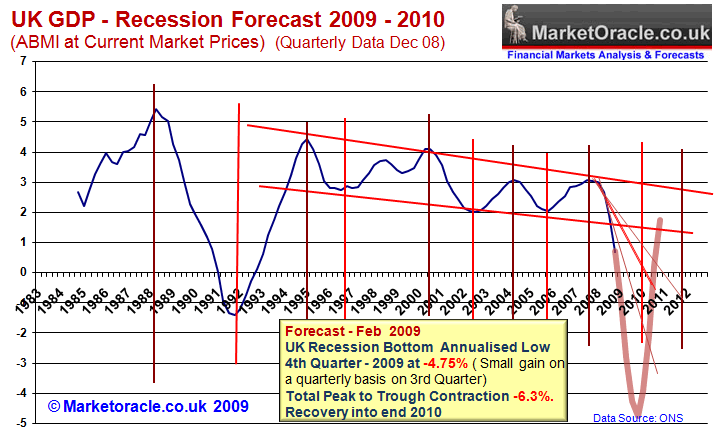UK Budget 2009 Debt Deficit, Basic Rate Income Tax Could Rise to 30%
Politics / UK Debt Apr 22, 2009 - 02:36 AM GMTBy: Nadeem_Walayat
 Today, Alistair Darling delivers his 2009 budget, the certainty of which will be to finally recognise the huge debt crisis that the country faces as this years budget deficit is set to explode to 12% of GDP or £160 billion which is set against Alistair Darlings November 08 forecast of £38 billion against my analysis at the time which pointed to a 2009 deficit of £160 billion (Bankrupt Britain Trending Towards Hyper-Inflation?). This and the recognition of the severe recession which will prompt a revision to economic contraction to GDP -3% from -1% for this year which is set against my forecast of -4.3% for 2009.
Today, Alistair Darling delivers his 2009 budget, the certainty of which will be to finally recognise the huge debt crisis that the country faces as this years budget deficit is set to explode to 12% of GDP or £160 billion which is set against Alistair Darlings November 08 forecast of £38 billion against my analysis at the time which pointed to a 2009 deficit of £160 billion (Bankrupt Britain Trending Towards Hyper-Inflation?). This and the recognition of the severe recession which will prompt a revision to economic contraction to GDP -3% from -1% for this year which is set against my forecast of -4.3% for 2009.
However the £160 billion deficit is just the tip of the debt iceberg as the Labour government is running both the unsustainable budget deficit on the countries visible balance sheet as well as off the balance sheet exploding tax payer liabilities that now project a rise from £1.5 trillion at the end of 2007 to £3.5 trillion by the end of 2010. As pointed out several times over the past 12 months following the Bank of England's initial £50 billion hand out to the soon to be Bankrupt banks in April 2008 that loan would in all likelihood never be repaid and mark the start of a series of hundred billion pound loans that would put Britain on the path towards a debt crisis that in the first instance would manifest itself in a sterling bear market whilst the Bank of England remained paralysed by the fear of inflation and failed to respond to the housing market crash of 2007-2009.
It was only after the Prime Minister, Gordon Brown in a shear panic move seized control of monetary policy on the 8th of October 2008 by announcing the first of a series of interest rate cuts at the Prime Ministers despatch box at Westminster and therefore ordered the Bank of England to start cutting interest rates without any regard for any other monetary or fiscal data or rules.
Official UK public sector net debt is put at some £617 billion at the end of the 2008, however as the following analysis illustrates there is a huge gap between official debt and the real liabilities that are being borne by the tax payers that seriously risk the bankruptcy of the country as liabilities look set to explode higher this year and several more years.
Quantitative Easing - Turning British Pound into Monopoly Money?
What is Quantitative Easing ? - Printing money to buy UK government bonds to force interest rates lower in advance of the 2010 UK General Election. The consequences of which is to devalue the value of the pound in the pocket and hard earned savings and therefore means much higher forward inflation.
Quantitative Easing is a manifestation of the failure of monetary policy, i.e. interest rates at 0.5% failing to simulate the UK economy, as a consequence of the bankrupt banking system. However 0.5% interest rates and printing of money is stoking the fires of not just high inflation but out of control inflation as occurred during the 1970's. This strongly suggests that at some point in the not so distant future we may be looking at a UK base rate at above 10% in an attempt to bring inflation back under control that will make today's recession feel like a picnic in comparison because unlike today's measures which are printing money to prevent deflation the government will be forced to cut the money supply to deflate prices, a much more painful process!

UK Recession
The economy is on track towards starting to recover by the end of 2009 from the worst recession since the Great Depression that is forecast to see GDP contraction of -6.3% as per the original forecast as of mid Feb 09. However as I have warned several times, that the growing debt mountain could trigger a double dip recession AFTER the next election as public spending cuts and tax rises are undertaken by the next government in an attempt to bring government debt under control. This therefore implies that we have not seen the end of Quantitative Easing as like a drug, it will be difficult to wean the economy off of it, therefore my expectation is that the government will force the Bank of England to accelerate Quantitative Easing far beyond the £75 billion announced to date. given the size of the growing annual budget deficits.

Bankrupt Banks Will Cost Britain £600 billion
The government is trying its hardest to hide the truth from the electorate that the losses from the banking sector will only amount to £37 billion, given the scale of liabilities that will hit £2 trillion this year this is a ridiculously small number, whilst my figure of £600 billion may prove overly pessimistic, one thing is for sure that the final bill will be well above £400 billion, which will become clearer once we see which of the major banks are left standing a year from now. Today's budget will clearly seek to raise this estimate given the IMF's estimate of a £200 billion bill for the bank bailouts. However Alistair Darling will likely opt for a much lower more politically acceptable figure in the region of £70 billion.
Labour Government in Panic - Heavy Tax Rises on the Horizon
The magnitude of the crisis is illustrated by the fact that the Labour government has already announced DELAYED tax rises BEFORE the next election, albeit these tax rises are only aimed at small sector of the electorate, i.e. a new 45p tax rate on those earning more than £150,000 that will only raise £1.6 billion per year, with other tax hikes raising an additional £1.6 billion. Still this and other tax rises do send out a strong signal of being just the tip of a tax hike ice-berg that will be implemented by which ever party wins the next election.
The annual deficit of at least £160 billion, which is BEFORE recognising the cost of the bankrupt banks at an estimated £600 billion is expected to continue well into 2010, as tax rises are delayed until after the next election. The deficit for 2010 could easily exceed £200 billion with ever higher deficits for several more years as the value of the currency falls in the wake of the Quantitative Easing monetization of debt.
This therefore guarantees far greater future tax hikes than the £3.2 billion announced to date, apart from the customary ever growing list of stealth taxes, direct taxation i.e. income tax will rise significantly with the top rate targeting 50% and the basic rate rising to possibly as high as 30% in an attempt to stabilise the public finances post the 2010 General Election. As I have mentioned earlier this will be coupled with deep cuts in public spending such as the NHS black hole that consumes ever more resources without any perceivable increase in output, that looks set to trigger a double dip recession during 2011 and into 2012, which could lead to widening in the budget deficit despite tax rises.
Anticipated Budget 2009 Key Announcements (Alistair Darlings Forecasts)
- Public sector borrowing to surge to £160 billion for 2009-10 with similar amount for 2010-2011
- UK GDP to contract by 3.5% this year, Grow by 1% 2010.
- Bank Bailouts to Cost £70 billion
- £4 billion back to work measures.
- Support for the Housing Market of between £1 and £2 billion.
The British electorate is more or less sleep walking towards as long as a decade of much higher taxes and reduced public services as a direct consequences of the Labour governments irresponsible management of the UK economy over at least the past 5 years, as the government has sought to change the rules in the face of failing to meet its own fiscal and budgetary targets that have now been altogether abandoned in the wake of the bankruptcy of the financial sector.
Subscribe to my always FREE Newsletter to get key analysis and forecasts in you in box.
By Nadeem Walayat
http://www.marketoracle.co.uk
Copyright © 2005-09 Marketoracle.co.uk (Market Oracle Ltd). All rights reserved.
Nadeem Walayat has over 20 years experience of trading derivatives, portfolio management and analysing the financial markets, including one of few who both anticipated and Beat the 1987 Crash. Nadeem's forward looking analysis specialises on the housing market and interest rates. Nadeem is the Editor of The Market Oracle, a FREE Daily Financial Markets Analysis & Forecasting online publication. We present in-depth analysis from over 250 experienced analysts on a range of views of the probable direction of the financial markets. Thus enabling our readers to arrive at an informed opinion on future market direction. http://www.marketoracle.co.uk
Disclaimer: The above is a matter of opinion provided for general information purposes only and is not intended as investment advice. Information and analysis above are derived from sources and utilising methods believed to be reliable, but we cannot accept responsibility for any trading losses you may incur as a result of this analysis. Individuals should consult with their personal financial advisors before engaging in any trading activities.
Nadeem Walayat Archive |
© 2005-2022 http://www.MarketOracle.co.uk - The Market Oracle is a FREE Daily Financial Markets Analysis & Forecasting online publication.



